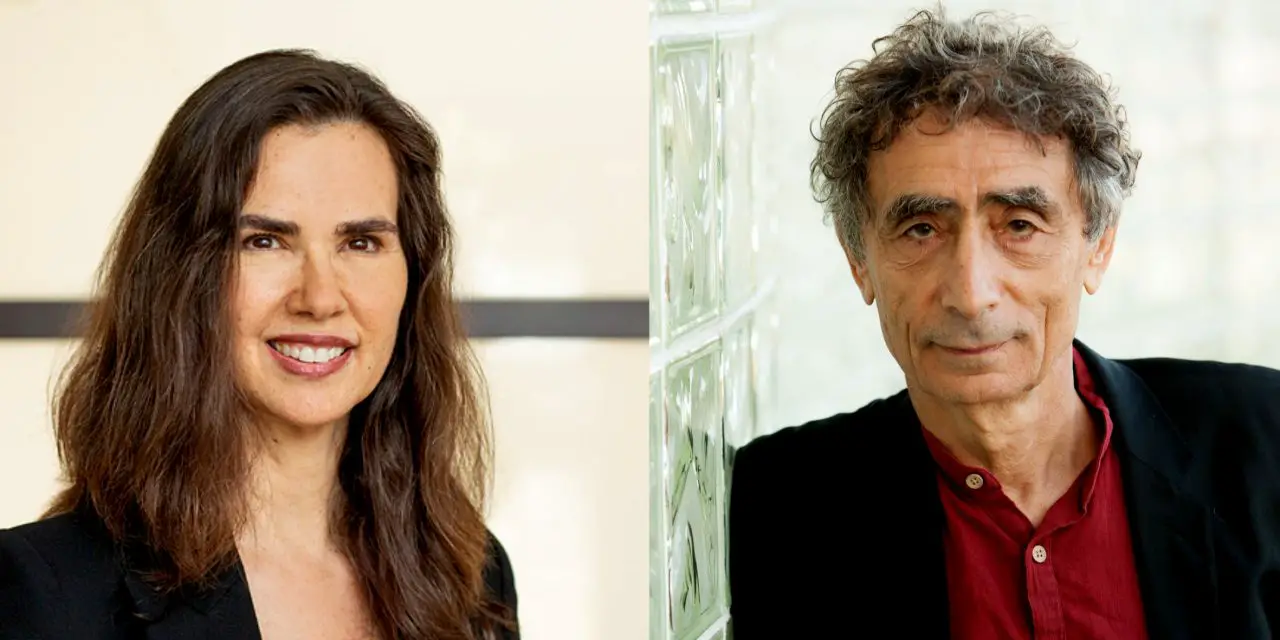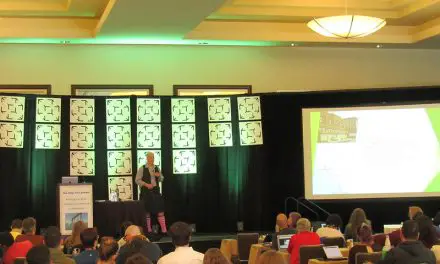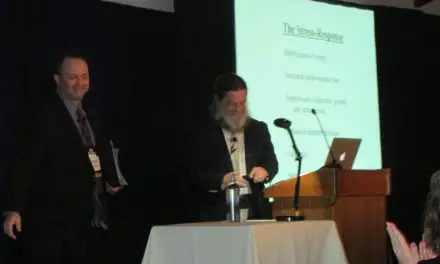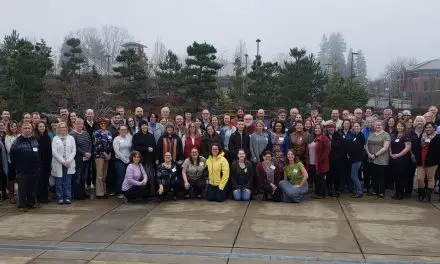Pain Society of Alberta (PSA) will be hosting its first official World Pain Summit next month virtually from Oct. 15 to 17. This event highlights the importance of self-compassion and how psychological and environmental factors affect physical health and chronic pain with psychologist Kristin Neff and Dr. Gabor Maté as the keynote speakers.
“I don’t think there’s a bigger voice on resiliency and self-compassion than Dr. Neff and Dr. Maté,” Dr. Rob Tanguay said, president of PSA. “I think it’s a great combination between the two.”
Dr. Leroy Little Bear, who founded the first Native American Studies Department at the University of Lethbridge in Alberta, Canada, will open and close the summit, talking about pain and health from an Indigenous Elder’s perspective.
Other speakers include a blend of clinicians, researchers, and those who are living with chronic pain:
- Dr. Carol Hopkins on including Indigenous Americans’ worldviews and culture with managing chronic pain;
- Dr. Bronwyn L. Thompson, Dr. Gregory Lehman, and Joletta Belton on the positive and negative effects of social media on pain;
- Physiotherapist Janet Holly takes a critical look at whether virtual reality can help alleviate pain from those with CRPS (complex regional pain syndrome).
“My goal is to help build and maintain some resiliency for people living with chronic pain, including healthcare providers who are watching and can take some of the messages home for themselves,” said Tanguay.
Christelle Zacharki, secretary general of PSA and conference committee chair of the World Pain Summit, said that one of the main points is to envision what clinical practice would be like if healthcare providers include more compassion in their care and patients feel like they are being heard.
“What does that mean for those with the lived experience of chronic pain and their caregivers?” she said.
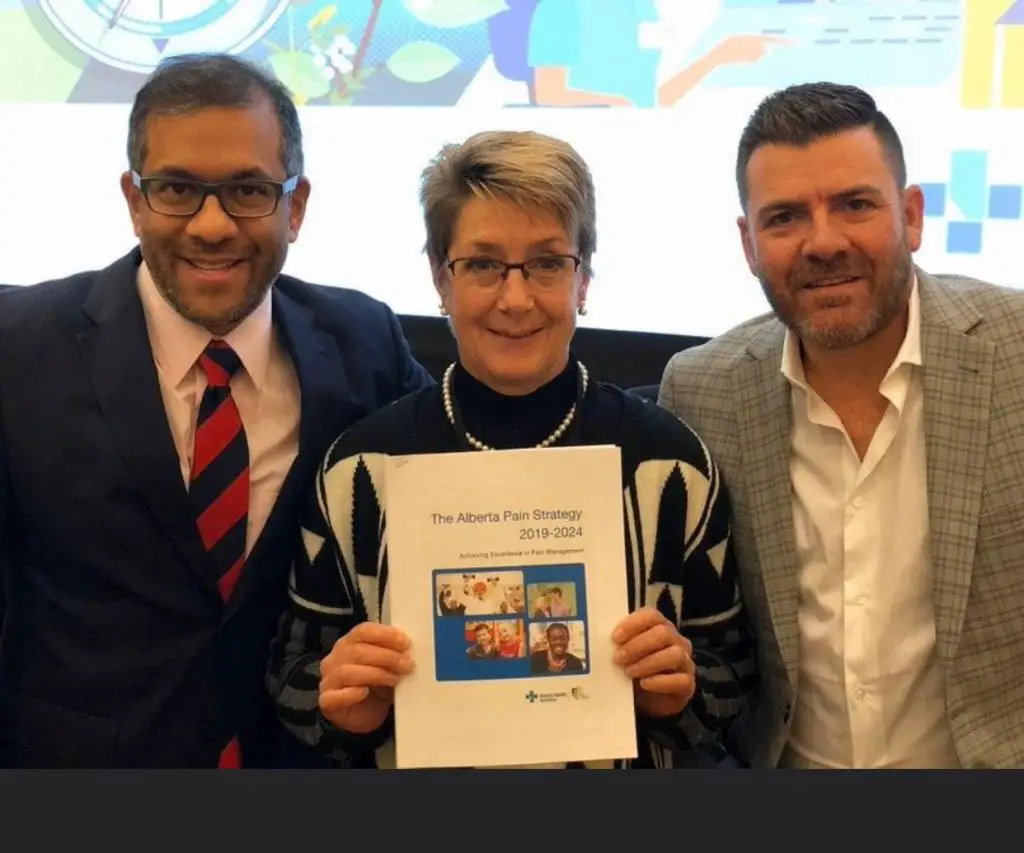
(l-r) Dr. John Pereira, Tracy Wasylak, and Dr. Rob Tanguay presenting the Agreement in Principle of the Alberta Pain Strategy at Lake Louise on Oct. 2019. Photo courtesy of Pain Society Alberta.
Pain Society of Alberta: expanding its roots
Nearly 20 years ago, a group of physicians from various practices got together and created the framework for Pain Society of Alberta. All of them shared a vision to improve pain management in their province.
“Their determination would lead them to establish an annual conference that would provide pain education to support people living with pain,” Zacharki said.
The early founders were Dr. Brian Knight, Dr. Marc Klasa, Dr. Rob Hauptman, Dr. Greg Boughen, Dr. Chris Spanswick, Dr. Pam Barton, Dr. Helen Hays, Dr.Chris Musah, and Dr. Gaylord Wardell.
About 60 to 80 clinicians from small pain clinics in Edmonton and Calgary showed up yearly. By 2017, PSA expanded to the point where it caught the attention of other Canadian and international pain conferences and research, such as Pain Australia, USASP, Canadian Task Force, IASP, and Pain BC.
“For the first time, [we brought] them all into one room, sharing experiences and learning from each other rather than everybody trying to invent their own wheel,” Tanguay said.
“We’ve elevated Pain Society and that comes from the right people within our circle, and we don’t mean that we’re siloing ourselves,” Zacharki said. “When you have people who are passionate and dedicated coming together to create a conference and support those who are living in pain, it really makes it magical.”

Taylor James Laviolette, RMT, who taught at the 2019 World Pain Summit, admires the serenity of Lake Louise. Photo: Stephania Johnson.
PSA has impacted several Canadian advocacy groups, such as Alberta Talks Pain, where they provide the platform for them to let their voices be heard while keeping their entities separate.
Tanguay mentioned that there are other Canadian pain-focused groups and advocates that are following a similar path, such as SaskPain in Saskatchewan and the Nova Scotia Chronic Pain.
“Ontario has more of an American healthcare feel with competing local hospitals and universities and lacks a centralized system,” Tanguay said. “Quebec has some pain groups which are based in universities, and the Atlantic provinces are building some momentum in grassroot movements.”
Despite the COVID-19 pandemic, PSA did not slow down the momentum the organization had built in the past five years.
“We want to bring in rheumatologists to talk about inflammatory pain,” Tanguay said. “[We’ve expanded] from fibromyalgia and the “zebra” folks (EDS) to headaches to rheumatoid arthritis. So how does PSA grow into those areas and internationally while maintaining its roots in Alberta?”
“I think curiosity is something to be pursued,” Zacharki emphasized. “If anyone is curious to learn about pain, it can be daunting to approach that area. If learning about pain piques your interest, we’d love to showcase our speakers and teams, and to provide a forum for connections — to let people chat and learn from each other.
“Keep the curiosity coming. If you’d like to change your practice, we would love to have you at the 2021 World Pain Summit.”
For more information about how you can sign up for the 2021 World Pain Summit, visit Pain Society of Alberta.
A native of San Diego for nearly 40 years, Nick Ng is an editor of Massage & Fitness Magazine, an online publication for manual therapists and the public who want to explore the science behind touch, pain, and exercise, and how to apply that in their hands-on practice or daily lives.
An alumni from San Diego State University with a B.A. in Graphic Communications, Nick also completed his massage therapy training at International Professional School of Bodywork in San Diego in 2014.
When he is not writing or reading, you would likely find him weightlifting at the gym, salsa dancing, or exploring new areas to walk and eat around Southern California.

